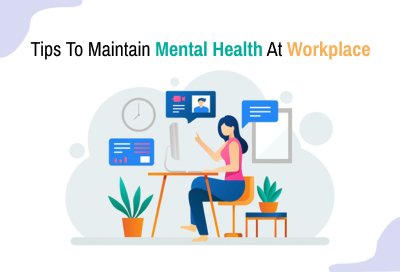
Work can positively affect our psychological health. It can cause us to have a decent outlook on ourselves and give us a sense of direction. It allows us an opportunity to connect with others, and access supports that we probably won't get outside of work. On the other hand, factors like occupational stress, work pressure, and discrimination can badly affect our mental health. At the point when we talk about mental health in the workplace, we are discussing about how our working environment affects us.
Either positively or negatively, how it affects our ability to doing our jobs, or how it influences our overall wellbeing. Obviously, a good working environment will not prevent or decrease all mental health problems. Hereditary, life experience, and past incidents also play a role for the mental illness. But employees can take a few steps to build and improve mental strength so they can live a healthy and stress free life. Here are a few effective ways that can assist to improve or maintain health at workplace. Have a look!
Ways To Improve Psychological Health In The Workplace
1. Start Your Day With A Mindful Morning
Rehearsing early morning yoga, meditate can assist your day to start in a purposeful way. Make a daily routine for morning walk, meditation, yoga and some other physical activities at least 45 minutes. These steps will definitely maintain your mental health.
2. Be Creative
Expressing creativity can advantage the mind in many ways than one. According to a survey, creativity decreases anxiety, stress and depression. There are numerous ways one can make something new. A portion of these incorporates crafts, join cooking classes, art, web design and many home projects.
3. Make Daily Connections
The sudden change to remote workplaces left numerous workers consistently ups and down between professional and personal duties. Because of this new dynamic, numerous representatives find themselves missing out on the social advantages of going to work every day. Use Zoom meetings and other technology to make your daily connections with co-workers.
4. Get Enough Sleep
Normally adults need 7-9 hours of quality sleep each night. If you can't get enough sleep on a regular basis, then it can impact, mood, energy and motivation. So, ensuring the body gets sufficient time to rest because it is vital for mental health.
5. Work Your Strengths
Since most of us see our shortcomings as changeable, and focus on improving these weaknesses. However, various investigations show that individuals develop quicker when they work on developing their strengths instead of working on their shortcomings. Furthermore, they're often more joyful, more sure and less stressed when they utilize their strengths.
6. Consume A Healthy Diet
When we see the food we eat as fuel for our body. A diet that is useful for your physical health is additionally useful for your mental health. It may be difficult to keep up a healthy pattern of eating at work. Regular healthy foods, additional plenty of water, are ideal. Try and plan for eating times at work, bringing food from home or picking healthy food when buying lunch.
7. Take Time For Things You Love
This will appear to be somewhat different for everyone. Regardless of whether it’s all about tracking, camping, etc., we all have activities that fulfill our personal satisfaction. Set aside time consistently to accomplish something you enjoy.
8. Perform A Random Act Of Kindness
Helping other people or just doing one random act of kindness can work on to increase self-confidence. Self-esteem act improves mental health in an assortment of ways, including a self-empowering sense of social connectivity.
9. Get Help When You Need It
Seeking assistance is an indication of strength, not a shortcoming. Furthermore, recall that treatment is effective. Individuals who get complete care can recuperate from mental illness and live a joyful life.
Concentrate on mental health in the office or any workplace is significant to employee care. Poor psychological health and stress can negatively affect employee job performance, communication and engagement with co-workers. Albeit above described activities do not serve as a ‘cure’ for mental problems they are useful and significant for keeping up with great psychological wellness.